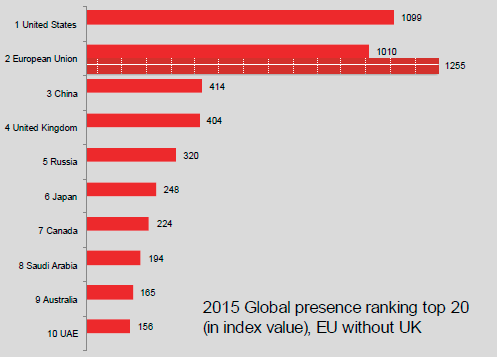
The implications of the EU referendum held in the United Kingdom are both deep and wide (see, for instance, an analysis of its implications for the European process here). This short piece aims at assessing (very preliminary) one of its derivatives, which is the value and features of the global presence of the European Union.
Global presence can be defined as the extent to which countries are ‘out there’ in the economic, military and soft domains. And this can be calculated with the Elcano Global Presence Index, containing 16 different variables (from manufacture exports to migrants or development cooperation).
The methodology of the Index allows the calculation of the global presence of the European Union, as if it were a single country. In other words, it shows the extent of the combined presence of all member states outside the Union’s boundaries; a figure that can be interesting when compared with that same value for other global players such as the United States or China.
Previous analyses point out to the fact that the European Union is actually a big global player or, at least, that it actually could be. Global presence is not the same as power but it might be some sort of leading indicator or precondition: countries that are present globally are in a better position to be powerful globally; and therefore to shape the globalization process and global governance.
This index for the European Union is calculated by adding the global presence of all member states (28 for the 2015 calculations) –that is, the external projection of Germany, France, Italy, etc. – and then detracting the presence of member states in one each other –the presence of Germany in Greece, the projection of Portugal in Spain, etc. –. Therefore, the exit of the United Kingdom from the European Union would have an impact on its own global presence but also on the global presence of the Union.
This impact will vary depending on the exact date of the exit (if it were to happen). This week might be only the beginning of a very long period of negotiations that will flow in parallel with a reconfiguration of the bilateral relations of the United Kingdom and with a whole new map of intra-European economic and soft relations. As a result, the global presence (both its value and shape) of all member states will be affected and, therefore, also, the Brexit impact on global presence.
And this impact will be both positive and negative (in strictly arithmetical terms). On the one hand, the presence of member states in the United Kingdom will be added to the aggregated value for the Union: in some way, the Brexit ‘externalises’ other members’ relations with this country and these will then be added to the record of global presence of the European Union. The methodology of the index does not allow (for now) calculating this magnitude. However, this will not be negligible, given that, for instance, almost 12% of tourists in the Union are of British origin, that 7% of imports from the rest of the European Union come from the United Kingdom, or that over 44% of British exports and 54% of imports go to and come from, respectively, the Union’s market.
On the other hand, there is an immediate (and quantifiable) negative impact on the value of global presence of the European Union. If (or when) the exit occurs, such global presence will become the result of the added value of the extra-European presence of 27 member countries (instead of 28).
In 2015, the global presence of the European Union was 1,255 points, bigger than that of the United States (1,098 points), despite the fact the latter country is perceived by far as more active player in the global scene and a top power (Graph). In other words, the European Union has the capacity to be more relevant in the globalization process.
If the United Kingdom had abandoned the European Union in 2015 (and not taking into account the augmentation effect derived from the externalisation of other members’ relations with the United Kingdom), the external projection of the European Union would have dropped to 1,010; that is, below that of the United States.

In this sense, Brexit has an enormous impact on the global presence of the European Union, which would be loosing its second biggest member in terms of GDP and the third in terms of population. This is consistent with this country’s contribution to the external projection of the Union (nearly 20%). This contribution is above that of any other member state (including Germany) (Table).

The net impact of Brexit on the magnitude of the global presence of the European Union is uncertain: it will depend on when this exit is materialized, on the extent to which the intra-European relations will be redefined meanwhile, on the extent of the relations between the United Kingdom and other member states (that will be then ‘externalised’) and on the magnitude of the contribution of the United Kingdom to Europe’s external projection.
However, presence is not the same as power. The European Union without the United Kingdom would be recording today at least 1,010 points of global presence. It would still be a major actor in global relations, a political unit with a dimension comparable to that of the United States with a size (and subsequent global responsibility) higher than that of any other country in the global scene.
Time to act?



